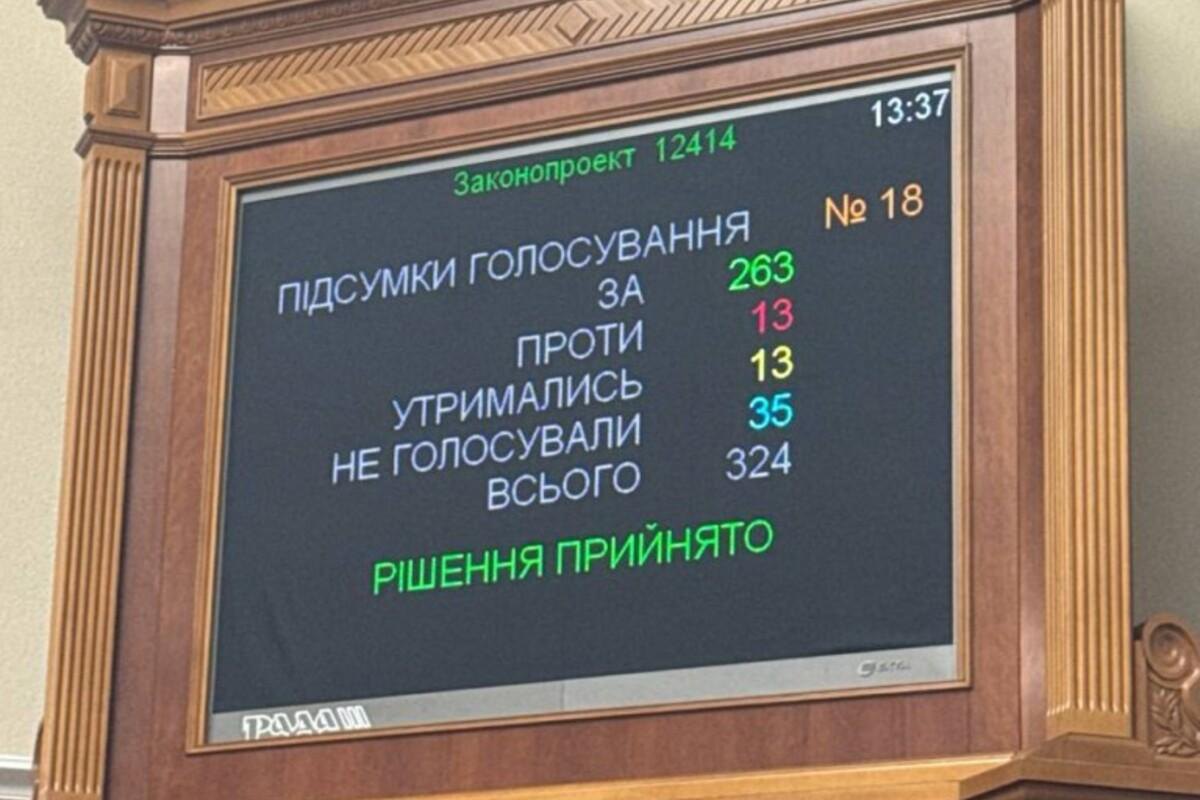
The July 22 vote on the scandalous draft law was the result of at least five fundamental violations of the Rules of Procedure, committed both by the Verkhovna Rada as a whole and personally by its Chairperson, Ruslan Stefanchuk, according to calculations by the civic initiative “Holka”. Each violation of the Rules of Procedure simultaneously constitutes a violation of at least three provisions of the Constitution.
Deliberate and numerous violations of the law by Parliament during the adoption of laws in the interest of certain individuals represent corruption at the highest level. These actions demonstrate a refusal to build a rule-of-law state no less than the scandalous provisions of draft law 12414, and they are no longer exceptional in the current parliament’s activity. One need only recall how MPs “overcame” Zelenskyy’s veto when voting for the law on Transcarpathia. In that case, Stefanchuk, as Speaker, played a key role as well.
Passing laws is an exclusive power of the Verkhovna Rada. And if a law receives the required number of votes from Members of Parliament, it is considered adopted. But this does not mean that Parliament has the right to do so in violation of laws and the Constitution.
In addition to the general principle of the rule-of-law state, which is enshrined in Article 1 of the Constitution, the Basic Law contains a number of specific requirements for the actions of Parliament. For example, Article 6 states that the legislative body shall exercise its powers within the limits established by the Constitution and in accordance with the laws of Ukraine.
Article 19 further states that state authorities and their officials shall act only on the basis of, within the scope of authority, and in the manner provided for by the Constitution and the laws of Ukraine. Regarding the procedure of the Verkhovna Rada, it is regulated by Article 83 of the Constitution and the Rules of Procedure.
The Law “On the Legal Regime of Martial Law” (Part 1, Article 9) further establishes that under martial law, the President and the Verkhovna Rada shall act exclusively on the basis of, within the scope of powers, and in the manner provided for by the Constitution and the laws. Therefore, compliance with the Rules of Procedure in its activities is a constitutional obligation of the Verkhovna Rada, just like the obligation of citizens to protect Ukraine’s independence and territorial integrity.
The legislative procedure is defined in Section IV of the Rules of Procedure, and adherence to it is mandatory in light of the aforementioned provisions. Part 3 of Article 50 of the Rules of Procedure specifies that on matters of legislative procedure, ad hoc decisions to deviate from procedures are allowed only for a clearly defined list of issues (such as postponing the consideration of draft laws, extending or shortening deadlines for submitting alternative draft laws, proposals and amendments, shortening the time for providing draft laws to MPs, and the duration of their consideration in committees).
The legislative procedure is not merely a formality. Despite its flaws, adherence to this procedure ensures at least a minimum level of both anti-corruption and public oversight of Parliament’s activities. Draft law 12414, which contains provisions aimed at undermining the independence of NABU (National Anti-Corruption Bureau of Ukraine) and the Specialized Anti-Corruption Prosecutor’s Office (SAPO), could not have been adopted at all if several violations of the Rules of Procedure had not occurred during its consideration.
1. Amendments regarding NABU and SAPO, by their content, could not have been included in the draft during its preparation for the second reading
According to Article 116 of the Rules of Procedure, proposals and amendments to a draft law prepared for the second reading may only be submitted in relation to the text of the draft law (sections, chapters, articles, their parts, points, subpoints, paragraphs, sentences) that was adopted as a basis.
A possible exception is when it is necessary to correct, clarify, eliminate errors and/or contradictions in the draft text — but only under two conditions:
1) The Verkhovna Rada explicitly voted for such corrections during the first reading;
2) The proposals and amendments must correspond to the subject matter of legal regulation of the draft law.
In the case of draft law 12414, the Verkhovna Rada did not adopt such a decision, and the amendments concerning NABU and SAPO are unrelated to the original draft law, which concerned the peculiarities of pre-trial investigations of criminal offenses related to the disappearance of persons under special circumstances during martial law.
Nevertheless, the MPs deliberately violated the Rules of Procedure when they voted in favor on July 22. After all, the violation of Article 116 was explicitly mentioned in the conclusion of the Main Legal Department, and MP Yaroslav Zheleznyak emphasized this twice during his speeches (as recorded in the plenary session transcript).
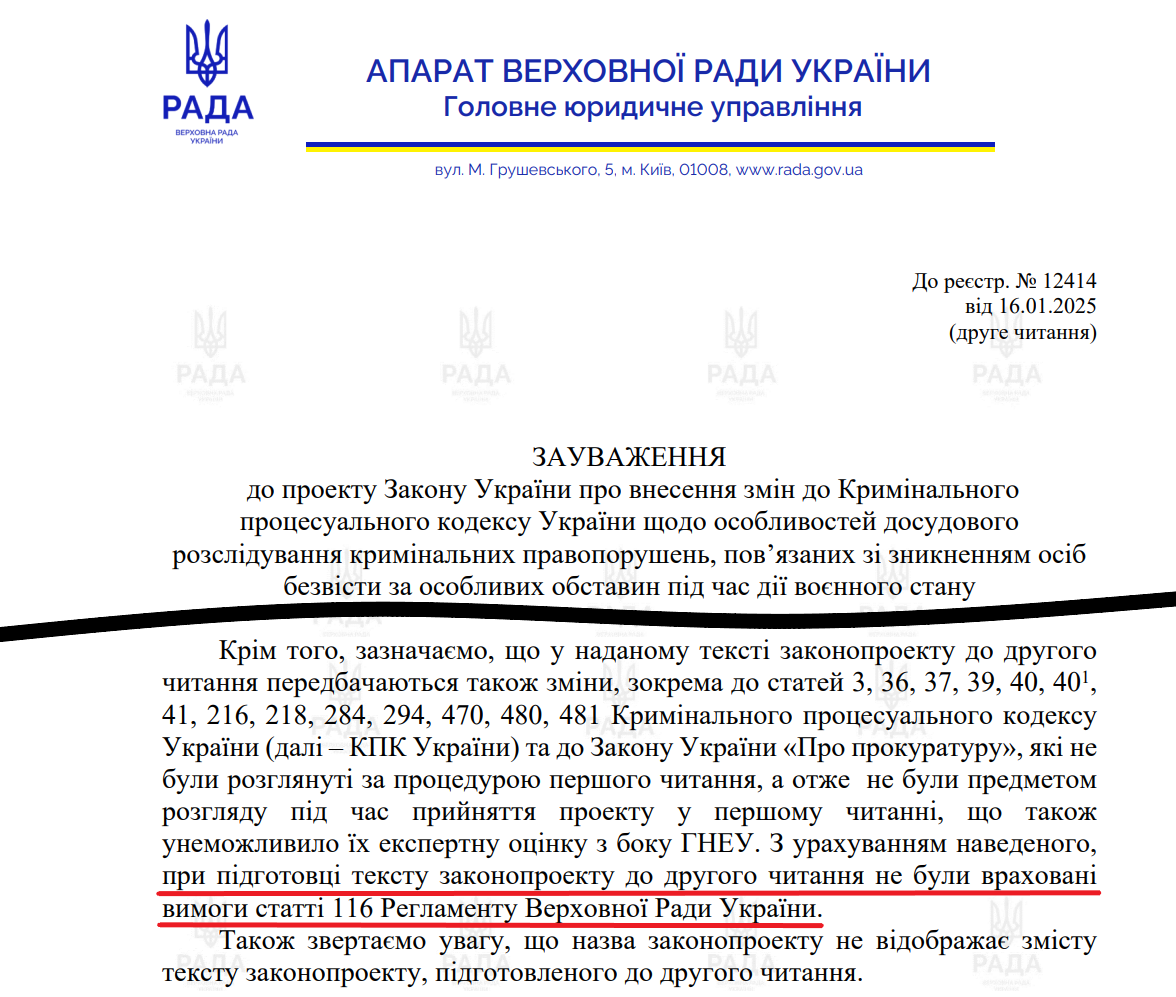
Compliance with the above-mentioned requirements of Article 116 of the Rules of Procedure is critically important in the legislative process. It helps to avoid both manipulations like this case and ordinary errors, since the procedure established by the Rules of Procedure includes a series of steps (such as an anti-corruption review by the relevant committee, scientific and expert analysis, etc.) only for the version adopted in the first reading.
However, violations of these requirements have become routine in order to push through various corruption-prone amendments to legislation and as a form of bribery for specific groups to gather votes in support of draft laws.
2. The amendments concerning NABU and SAP were submitted in violation of the established deadlines
It is Article 116 of the Rules of Procedure that sets a 14-day deadline for submitting proposals and amendments to a draft law after it has been adopted in the first reading. Parliament has the right to extend this deadline, but did not do so in this case.
Adhering to this rule is important to prevent both the obstruction of preparing draft laws through endless amendment spam and corrupt schemes in which new provisions are added at the last minute.
Draft law No. 12414 was adopted in the first reading on April 29, while the proposals concerning NABU and SAP were submitted by MP Maksym Buzhanskyy almost four months later — on July 22. The main responsibility for violating the rules during their review and inclusion in the final version lies with the Verkhovna Rada Committee on Law Enforcement and specifically with its deputy chair Maksym Pavlyuk, who convened and led the relevant committee meeting.
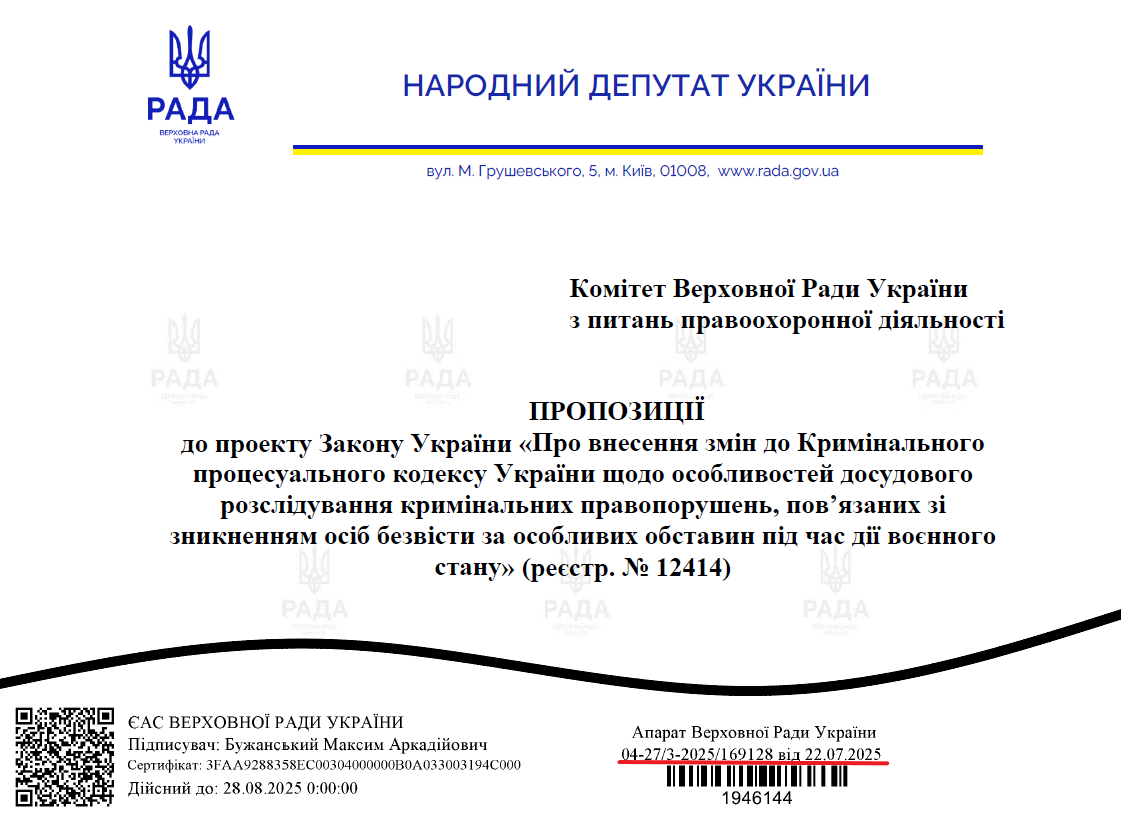
3. Violation of the deadline for providing the draft law to MPs
According to Article 117 of the Rules of Procedure, a draft law prepared for the second reading, along with the opinion of the main committee and other supporting documents, must be provided to MPs no later than ten days before its consideration at a plenary session. Article 101 of the Rules of Procedure allows this period to be shortened, but only if the draft law is recognised as urgent. Even in such cases, the time frame may not be reduced by more than half.
These requirements are also critically important to ensure that MPs can fully examine the content of the draft laws and that the public can monitor the process, since the draft must not only be given to parliamentarians but also published on the website of the Verkhovna Rada.
However, draft law 12414 was reviewed by the committee in the morning before being brought to the session hall and was published literally five minutes before the start of the sitting. Therefore, MPs once again knowingly violated the Rules of Procedure when they cast their votes in favour.
4. Speaker of the Verkhovna Rada Ruslan Stefanchuk did not stop the violation of the Rules of Procedure
Article 88 of the Constitution states that the Speaker of the Verkhovna Rada shall exercise their powers in accordance with the procedure established by the Rules of Procedure. Article 48 of the Rules of Procedure stipulates that the chairperson of a plenary sitting must immediately take measures to eliminate any violations of the Rules that occur during the consideration and voting on a matter.
Several MPs repeatedly pointed out the violations of the Rules of Procedure and appealed to Ruslan Stefanchuk to address them. However, Stefanchuk demonstratively refused to carry out his direct duty.
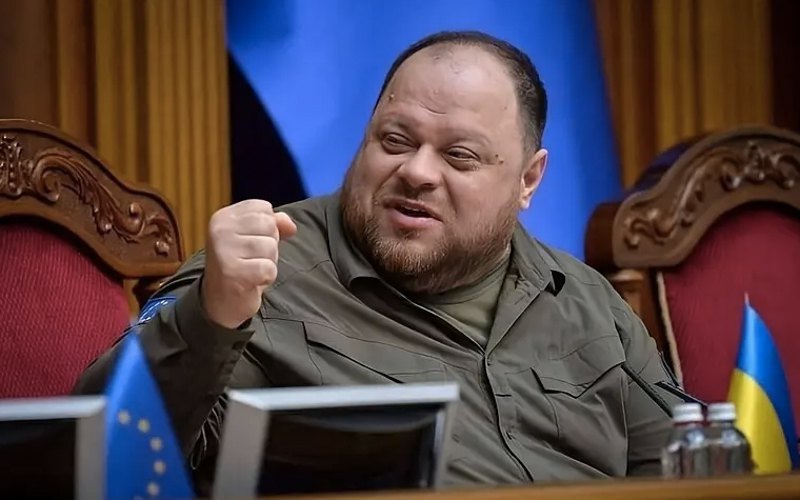
As a result of Speaker Stefanchuk’s blatant violation of the Rules of Procedure during the consideration of Draft Law No. 12414, the ‘European Solidarity’ and ‘Holos’ factions called for his removal from presiding over the session. However, the proposal received only 23 votes, which once again demonstrated that the majority supported violations of the legal requirements for parliamentary procedure.
5. The Verkhovna Rada had no right to decide on the urgent signing of the adopted law
After passing Draft Law No. 12414, the Verkhovna Rada, at the proposal of Maksym Buzhanskyy, supported its urgent signing by the Speaker of Parliament. However, the Rada had no legal authority to adopt such a resolution.
According to Part 2 of Article 130 of the Rules of Procedure, the Speaker of Parliament shall sign a law no earlier than two and no later than five days after it has been submitted for signing. The act of signing a law is part of the legislative process, and the aforementioned Article 50 of the Rules of Procedure does not allow the Verkhovna Rada to adopt a one-time deviation from this norm.
A post by Oleksandra Matviichuk, who submitted a petition on the President’s Office website calling for a veto, further illustrates the issue — the petition wasn’t even published in time. In this way, instruments of digital democracy lose their meaning.
The Speaker’s obligation to wait at least two days before signing a law is a critical safeguard against procedural violations and manipulations of the text before it is submitted to the President for signing.
Indeed, the Rules of Procedure (Articles 48 and 130) establish a two-day period during which MPs may submit complaints to the Speaker in case of procedural violations or text manipulations. Until such a complaint is considered by Parliament, the Speaker is prohibited from signing the adopted law, and the Rada has the right to annul its adoption.
In the context of this violation, it is crucial to highlight the intentions of the Verkhovna Rada when reviewing the draft law submitted by Volodymyr Zelenskyy aimed at reversing the amendments introduced by Draft Law No. 12414. According to Speaker Ruslan Stefanchuk, MPs will again be asked to support its urgent signing immediately after its adoption by Parliament.
Such actions are a trap. Stefanchuk is essentially attempting to legitimize the systemic violations of the Rules of Procedure in the operation of the Verkhovna Rada in the same manner as during the adoption of Draft Law No. 12414 — but this time under the guise of meeting the demands of society and international partners.
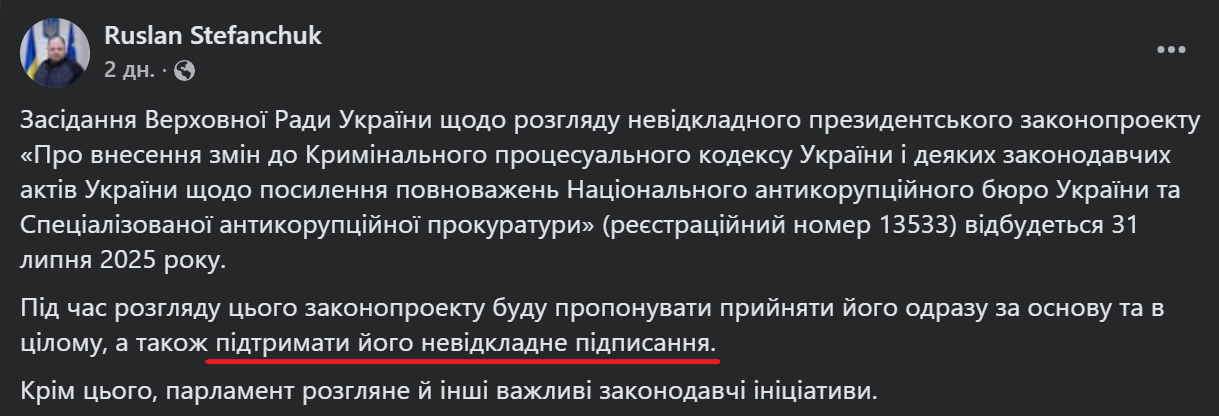
Hardly anyone doubts that the story with draft law 12414 is the result of the president’s, his Office’s, and a significant number of deputies’ desire to deprive NABU and SAP of their independence. All these people clearly understood that such intentions would be negatively perceived both by society and foreign partners. Therefore, their whole plan was a blitzkrieg — to organize the president’s signed law with the desired provisions so quickly that no one would have time to react.
But there was an obstacle to their intentions — the Verkhovna Rada’s Rules of Procedure, the mandatory observance of which is established by the Constitution. So the Rules were blatantly violated. Not once, but at least five times. All violations without exception were necessary to realize their plans, and together they allowed the scheme to be carried out in a matter of hours.
And each such violation of the Rules simultaneously violates at least three requirements of the Constitution. The guarantor of the Constitution traditionally did not care about them.
The adoption of draft law 12414 is not the biggest problem, but merely a consequence of the Verkhovna Rada’s usual style of work in recent years, which considers itself above the Constitution and laws. And this style — directed from the President’s Office — is one of the signs of establishing dictatorship and usurpation of power.
This story also clearly shows the mechanisms by which the majority effectively deprives the parliamentary opposition of a voice: first, the Verkhovna Rada chairman Stefanchuk does not fulfill his duties and violates the Rules himself, and then the majority illegally deprives opposition deputies of their guaranteed right to challenge the illegality of the Verkhovna Rada’s actions within two days after the law’s adoption.
The planned upcoming restoration of NABU’s and SAP’s independence is a significant victory for society. But it will hardly affect the overall course of events in the country if society does not equally actively demand that the Verkhovna Rada unconditionally comply with the Rules of Procedure in its legislative activity. The Rules are not a panacea, but their observance will create a mechanism for society to control government actions, at least in lawmaking, without permanent Maydan protests.
Unfortunately, deputies can continue to violate the Rules with impunity because, according to Article 80 of the Constitution, they are legally not responsible for the results of their voting. But will NABU and SAP have the will to punish those responsible in this situation?







